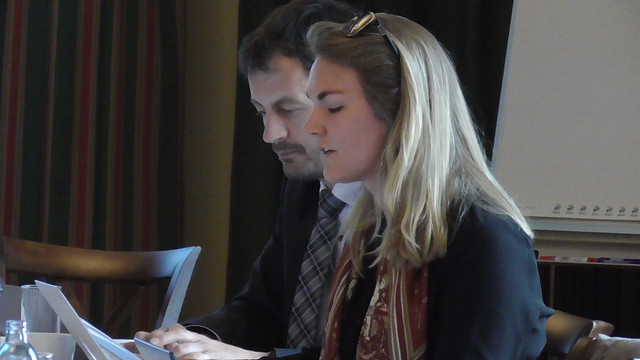Bratislava, Slovakia—The fourth meeting of the Central European Initiative was held in Bratislava, following previous roundtable discussions in Vienna, Budapest and Prague.
The meeting titled “Family Values and Policies, Religious Freedom, European Culture: Challenges and Opportunities in Central Europe Today” was held on July 25, 2017, in the Hotel Apollo.
Political and religious leaders and NGO representatives were among the 26 participants from six European nations who discussed the family, religious freedom and the European cultural legacy.
The roundtable was convened by Nina Nováková, a member of the Czech Parliament, and Jacques Marion, the regional vice president of UPF for Europe and the Middle East.
The first panel, “State and Parental Responsibility over Children’s Education,” was opened by Mrs. Nováková.
If society is considered as an ecosystem, then the family is the basic unit for survival, Mrs. Nováková said. Parents should be partners for schools and not “clients,” and their role should be upgraded in society, she said. The World Health Organization (WHO) approach deals with the physical aspects of human beings, but the search for purpose and values also must be considered, she said.
Marek Krajčí, a member of the Slovak Parliament, spoke about the need to build a family-friendly nation. Using statistics, he described the changing trends in lifestyles. Birth-rates are declining and late pregnancies are increasing, due to women preferring career over family. People are living individualistic and hedonistic lifestyles; this trend should change for emphasis on good and prosperous families, he said.
Anna Záborská from Slovakia, a member of the European Parliament, said that religion and ideology influence the formulation of laws, but survival itself is based on the rule of nature. Same-sex relationships cannot reproduce. Referring to the Istanbul Protocol, a set of international guidelines meant to stop torture, she said that gender independence will not protect girls from violence.
Renáta Ocilková, a human rights coordinator of the Catholic Bishops Conference in Slovakia, highlighted critical points in the Slovak legislation concerning sexual education in schools. The tendency is to uproot traditional patterns of the family, she said. The Slovak constitution protects the original family unit. We should be aware of deconstructive trends, monitor them and react before things go in the wrong direction, she said.
Grzegorz Strzemecki, a conservative writer from Poland, spoke about how parents often are misguided or misinformed. The current philosophy lacks a moral foundation—52 percent of Polish people support same-sex marriage. The lacking morality should be replaced by pro-family narratives to regain the lost ground, he said.
Stanislav Trnovec from the Slovak organization Large Families Club said that Europe is so weak in dealing with the refugee crisis partly because it suffers from low birth-rates. Since large families have become a minority, we should treat them with more care, he said.
Maria Neuberger Schmidt from Austria, the founder of the organization Parents Workshop, asked: If parents are weak, who will protect children? Thus, parents need special training and guidance, she said. She described various educational courses for parents.
The second panel focused on “Religious Freedom: A Fundamental Freedom in a Changing World.” Peter Zoehrer from the Forum for Religious Freedom (FOREF) Europe reminded participants of Article 18 of the Universal Declaration of Human Rights (UDHR), which guarantees religious freedom. But not all religions behave as well as they should, he said. Anyone who attacks the family attacks religion first, he maintained.
Eduard Heger, a member of the Slovak Parliament, spoke about various cultural, historical and traditional dimensions in life. He reflected on historical wounds in the Middle East as well as on the lack of democratic practice. He suggested that we need a clearer definition of the nature and purpose of religion.
Martin Dilong, the president of the Work, Family and Education Institute in Slovakia, spoke about legal aspects of religious freedom. Churches should be masters of their own destiny, he said. Instead of discussing the clash of civilizations, we should focus on dialogue, cooperation, personal prayer and personal friendship. The three strongest enemies are ignorance, indifference, and fear, he said.
Alexandra Tompson from Alliance Defending Freedom (ADF) International, a Vienna-based organization that defends religious freedom, spoke about freedom of thought and conscience. Referring to some special cases in Europe, she outlined how human rights were violated when freedom of conscience is denied.
Harald Scheu from the Faculty of Law of Charles University in Prague spoke about two levels of religious freedom. Rights, responsibility and duty are not separable, he said. Minority protection should be considered a human right, but no minority should take a dominant position. The law does not recognize the term “sexual minority”; there is no convention to protect it, he said.
The third panel dealt with the topic “European Cultural Legacy: What Does It Mean in Europe Today?” Juraj Lajda, secretary general of the Czech chapter of UPF, presented an overview of the two philosophies shaping our present European culture. Hebraism and Hellenism influence the thinking and lifestyle even of modern Europe; however, today they have been replaced by plain materialism and selfish individualism. We need to find a new paradigm, he said.
Jacques Marion, the regional vice president of UPF for Europe and the Middle East, said that today’s trends to deconstruct the family are based on resentments similar to those of communism. As the family is under attack, we need to mobilize different levels of society for its protection, he said. For this purpose, we need to work together and stop the deconstruction.
In conclusion, Nina Nováková said that today´s extreme liberalism could replace religion. Egoism and individualism are the new religion, which may lead to a new kind of totalitarianism! She proposed that an international civil organization be established which can address all citizens and be open to unlikely allies. We should revive the true spirit of Europe, she said.

